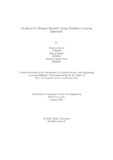| dc.contributor.advisor | Ajwad, Rasif | |
| dc.contributor.advisor | Ashraf, Faisal Bin | |
| dc.contributor.author | Sayeed, Sanjana | |
| dc.contributor.author | Rashid, Iktisad | |
| dc.contributor.author | Sotej, Muktadir Rabbi | |
| dc.date.accessioned | 2021-12-13T09:02:59Z | |
| dc.date.available | 2021-12-13T09:02:59Z | |
| dc.date.copyright | 2021 | |
| dc.date.issued | 2021-01 | |
| dc.identifier.other | ID 17301189 | |
| dc.identifier.other | ID 16231004 | |
| dc.identifier.other | ID 16101113 | |
| dc.identifier.uri | http://hdl.handle.net/10361/15734 | |
| dc.description | This thesis is submitted in partial fulfillment of the requirements for the degree of Bachelor of Science in Computer Science and Engineering, 2021. | en_US |
| dc.description | Cataloged from PDF version of thesis. | |
| dc.description | Includes bibliographical references (pages 62-65). | |
| dc.description.abstract | Dengue is a viral disease that spreads in tropical and subtropical regions and is especially prevalent in South-East Asia. To some certain extent, this mosquito-borne
disease triggers nationwide epidemics, which results in large number of fatalities. In
our study, we mainly worked with two data sets from two countries: Bangladesh and
Vietnam. For the Vietnamese data set we have used supervised learning and implemented different prediction models like Decision Tree Classifier, Random Forest,
Gradient Boosting, Ada Boosting, XG-Boosting Classifier Model and have taken the
best fitted one (that being XG-Boosting Classifier) to predict the severity amongst
the dengue infected patients. After predicting severity we analyzed the data set
further to identify what might be the possible cause leading towards the DSS or
the DHF for the clinical data. In parallel, for the Bangladeshi data set we applied
the unsupervised learning technique, Hierarchical Clustering, to find the different
clusters of various vital components of the patients according to their blood report.
We then analyzed the clusters further to find the severity among the patients, which
led them to DSS or DHF. | en_US |
| dc.description.statementofresponsibility | Sanjana Sayeed | |
| dc.description.statementofresponsibility | Iktisad Rashid | |
| dc.description.statementofresponsibility | Muktadir Rabbi Sotej | |
| dc.format.extent | 65 pages | |
| dc.language.iso | en | en_US |
| dc.publisher | Brac University | en_US |
| dc.rights | Brac University theses are protected by copyright. They may be viewed from this source for any purpose, but reproduction or distribution in any format is prohibited without written permission. | |
| dc.subject | Dengue | en_US |
| dc.subject | DSS | en_US |
| dc.subject | DHF | en_US |
| dc.subject | Supervised | en_US |
| dc.subject | Unsupervised | en_US |
| dc.subject | Hierarchical clustering | en_US |
| dc.subject | Xg-boosting | en_US |
| dc.subject | Clinical data | en_US |
| dc.subject.lcsh | Machine Learning | |
| dc.title | Analysis on dengue severity using machine learning approach | en_US |
| dc.type | Thesis | en_US |
| dc.contributor.department | Department of Computer Science and Engineering, Brac University | |
| dc.description.degree | B. Computer Science | |

